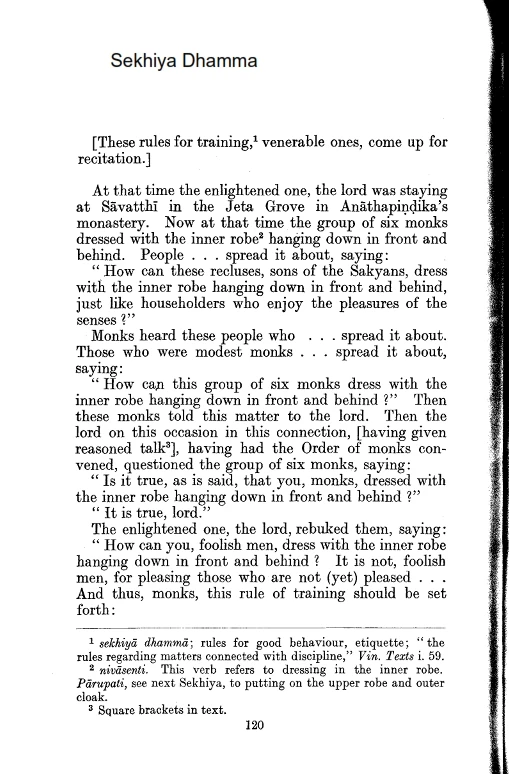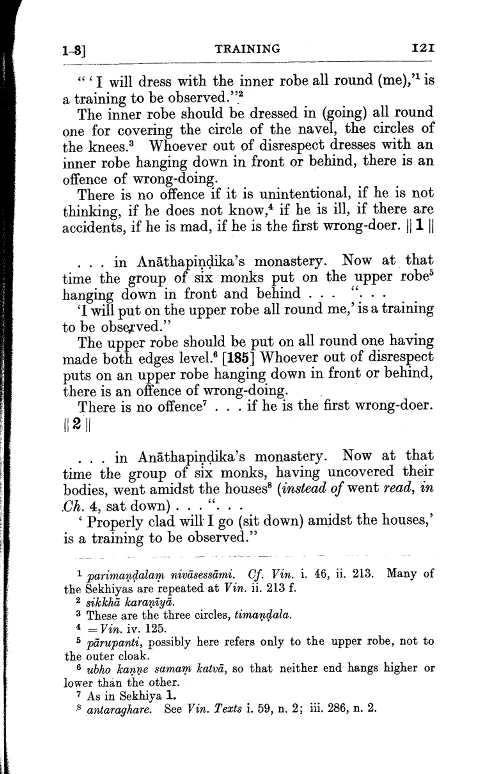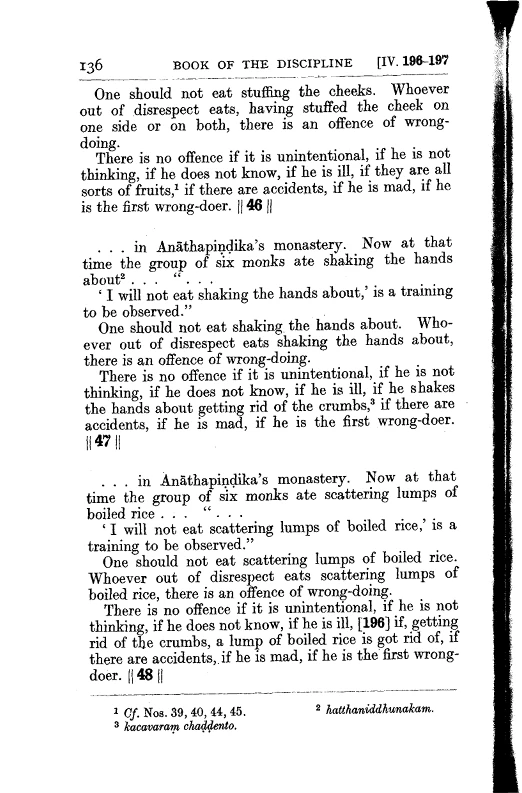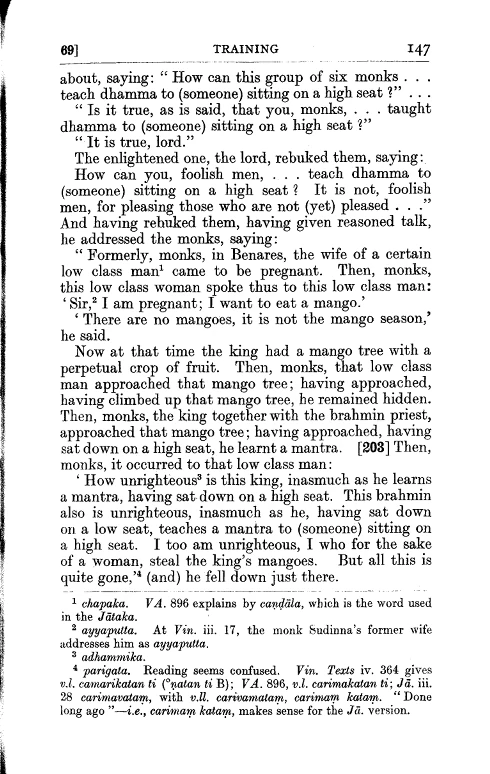Tipitaka >> Vinaya Pitaka >> Sekhiya Dhamma
Translated from the Pâli by T. W. Rhys Davids (1881)
THE PATIMOKKHA
7. SEKHIYA DHAMMA[]
(TRAINEES RULES)
Pali Versions : Pali-English Version & Pali-Devanagri Version
Text : File:VN-PM-Sekhiya-M.pdf
SEKHIYA SCANNED BOOK[]
Sekhiya Summary[]
Here, venerable Sirs, the rules regarding matters connected with discipline come into recitation.
First Section[]
- 1. 'I will put on my under garment all around me.' This is a discipline which ought to be observed.
- 2. 'I will put on my robe all around me.' This is a discipline which ought to be observed.
- 3. 'Properly clad will I go amidst the houses. This is a discipline which ought to be observed.
- 4. 'Properly clad will I take my seat amidst the houses.' This is a discipline which ought to be observed.
- 5. '(With my body) under proper control will I go amidst the houses.' This is a discipline which ought to be observed.
- 6. '(With my body) under proper control will I take my seat amidst the houses.' This is a discipline which ought to be observed.
- 7. 'With downcast eye will I go amidst the houses.' This is a discipline which ought to be observed.
- 8. 'With downcast eye will I take my seat amidst the houses.' This is a discipline which ought to be observed.
- 9. 'With robes not pulled up will I go amidst the houses.' This is a discipline which ought to be observed.
- 10. 'With robes not pulled up will I take my seat amidst the houses.' This is a discipline which ought to be observed.
End of the first section.
Second Section[]
- 11. 'Not with loud laughter will I go amidst the houses.' This is a discipline which ought to be observed.
- 12. 'Not with loud laughter will I take my seat amidst the houses.' This is a discipline which ought to be observed.
- 13. 'Making but a little sound will I go amidst the houses.' This is a discipline which ought to be observed.
- 14. 'Making but a little sound will I take my seat amidst the houses.' This is a discipline which ought to be observed.
- 15. 'Without swaying my body about will I go amidst the houses.' This is a discipline which ought to be observed.
- 16. 'Without swaying my body about will I take my seat amidst the houses.' This is a discipline which ought to be observed.
- 17. 'Without swaying my arms about will I go amidst the houses.' This is a discipline which ought to be observed.
- 18. 'Without swaying my arms about will I take my seat amidst the houses.' This is a discipline which ought to be observed.
- 19. 'Without swaying my head about will I go amidst the houses.' This is a discipline which ought to be observed.
- 20. 'Without swaying my head about will I take my seat amidst the houses.' This is a discipline which ought to be observed.
End of the second section.
Third Section[]
- 21. ' With my arms not akimbo will I go amidst the houses.' This is a discipline which ought to be observed.
- 22. 'With my arms not akimbo will I take my seat amidst the houses.' This is a discipline which ought to be observed.
- 23. 'With my head uncovered will I go amidst the houses.' This is a discipline which ought to be observed.
- 24. 'With my head uncovered will I take my seat amidst the houses.' This is a discipline which ought to be observed.
- 25. 'Without walking on my heels or my toes(tiptoeing) will I go amidst the houses.' This is a discipline which ought to be observed.
- 26. 'Without lolling will I take my seat amidst the houses.' This is a discipline which ought to be observed.
- 27. 'With mind alert will I receive an alms.' This is a discipline which ought to be observed.
- 28. 'Paying attention to my bowl will I receive an alms.' This is a discipline which ought to be observed.
- 29. 'With equal curry will I receive an alms.' This is a discipline which ought to be observed.
- 30. 'Equally full will I receive an alms.' This is a discipline which ought to be observed.
End of the third section.
Fourth Section[]
- 31. 'With mind alert will I eat the alms placed in my bowl.' This is a discipline which ought to be observed.
- 32. 'Paying attention to my bowl will I eat the alms placed in my bowl.' This is a discipline which ought to be observed.
- 33. 'Begging straight on from house to house1 will I eat the alms pIaced in my bowl.' This is a discipline which ought to be observed.
- 34. 'With equal curry will I eat the alms placed in my bowl.' This is a discipline which ought to be observed.
- 35. 'Without pressing down from the top2 will I eat the alms placed in my bowl.' This is a discipline which ought to be observed.
- 36. 'Neither the curry nor the condiment will I cover up with the rice, desiring to make it nicer.' This is a discipline which ought to be observed.
- 37. 'Neither curry nor rice will I ask for, for my own particular use, unless I am sick.' This is discipline which ought to be observed.
- 38. 'Not with envious thoughts will I look at others' bowls.' This is a discipline which ought to be observed.
- 39. 'Not into too large balls will I make (up my food).' This is a discipline which ought to be observed.
- 40. 'Into round mouthfuls will I make up my food.' This is a discipline which ought to be observed.
End of the fourth section.
Fifth Section[]
- 41. 'Not till the ball is brought close will I open the door of my mouth.' This is a discipline which ought to be observed.
- 42. 'Not the whole hand, when eating, will I put into my mouth.' This is a discipline which ought to be observed.
- 43. 'When the food is in my mouth will I not talk.' This is a discipline which ought to be observed.
- 44. 'Without tossing the food into my mouth will I eat.' This is a discipline which ought to be observed.
- 45. 'Without nibbling at the balls of food will I eat.' This is a discipline which ought to be observed.
- 46. 'Without stuffing my cheeks out will I eat.' This is a discipline which ought to be observed.
- 47. 'Without shaking my hands about will I eat.' This is a discipline which ought to be observed.
- 48. 'Without scattering the lumps of boiled rice will I eat.' This is a discipline which ought to be observed.
- 49. 'Without putting out my tongue will I eat.' This is a discipline which ought to be observed.
- 50. 'Without smacking my lips will I eat.' This is a discipline which ought to be observed.
End of the fifth section.
Sixth Section[]
- 51. 'Without making a hissing sound will I eat,' This is a discipline which ought to be observed.
- 52. 'Without licking my fingers will I eat.' This is a discipline which ought to be observed.
- 53. 'Without licking my bowl will I eat.' This is a discipline which ought to be observed.
- 54. 'Without licking my lips will I eat.' This is a discipline which ought to be observed,
- 55. 'Not with a hand soiled with food will I take hold of the water-jar.' This is a discipline which ought to be observed.
- 56. 'The rinsings of the bowl mixed with lumps of boiled rice will I not throw into the inner court.' This is a discipline which ought to be observed.
- 57. 'Not to a person with a sunshade in his hand, unless he is sick, will I preach the Dhamma.' This is a discipline which ought to be observed.
- 58. 'Not to a person with a staff in his hand, unless he is sick, will I preach the Dhamma.' This is a discipline which ought to be observed.
- 59. 'Not to a person with a sword in his hand, unless he is sick, will I preach the Dhamma.' This is a discipline which ought to be observed,
- 60. 'Not to a person with a weapon in his hand, unless he is sick, will I preach the Dhamma.' This is a discipline which ought to be observed.
End of the sixth section.
Seventh Section[]
- 61. 'Not to a person wearing slippers, unless he is sick, will I preach the Dhamma.' This is a discipline which ought to be observed.
- 62. 'Not to a person wearing sandals, unless he is sick, will I preach the Dhamma.' This is a discipline which ought to be observed.
- 63. 'Not to a person seated in a cart, unless he is sick, will I preach the Dhamma.' This is a discipline which ought to be observed.
- 64. 'Not to a person lying on a couch, unless he is sick, will I preach the Dhamma.' This is a discipline which ought to be observed.
- 65. 'Not to a person lolling, unless he is sick, will I preach the Dhamma.' This is a discipline which ought to be observed.
- 66. 'Not to a person with a turban on his head, unless he is sick, will I preach the Dhamma.' This is a discipline which ought to be observed.
- 67. 'Not to a person with his head covered, unless he is sick, will I preach the Dhamma.' This is a discipline which ought to be observed.
- 68. 'Not to a person seated on a seat, unless he is sick, will I, seated on the earth, preach the Dhamma.' This is a discipline which ought to be observed.
- 69. 'Not to a person seated on a high seat, unless he is sick, will I, seated on a low seat, preach the Dhamma.' This is a discipline which ought to be observed.
- 70. 'Not to a person sitting, unless he is sick, will I, standing, preach the Dhamma.' This is a discipline which ought to be observed.
End of the seventh section.
Eighth Section[]
- 71 .'Not to a person walking in front of me, unless he is sick, will I, walking behind, preach the Dhamma.' This is a discipline which ought to be observed.
- 72. 'Not to a person walking on a path, unless he is sick, will I, walking by the side of the path, preach the Dhamma.' This is a discipline which ought to be observed.
- 73. 'Not standing will I ease myself, unless I am sick.' This is a discipline which ought to be observed.
- 74. 'Not on growing grass will I ease myself, or spit.' This is a discipline which ought to be observed.
- 75. 'Not into water will I ease myself, or spit.' This is a discipline which ought to be observed.
- Venerable Sirs, the rules regarding matters of discipline have been recited.
- ln respect of them I ask the venerable ones, 'Are you pure in this matter?'
- A second time I ask the venerable ones, 'Are you pure in this matter?'
- A third time I ask the venerable ones, 'Are you pure in this matter?'
- The venerable ones are pure here. Therefore do they keep silence. Thus I understand.
Here ends the recitation of the Sekhiya Dhamma(Trainees Rules)

































